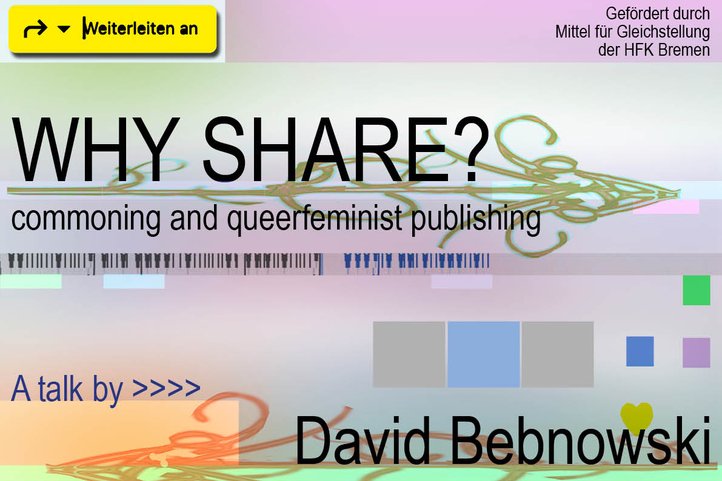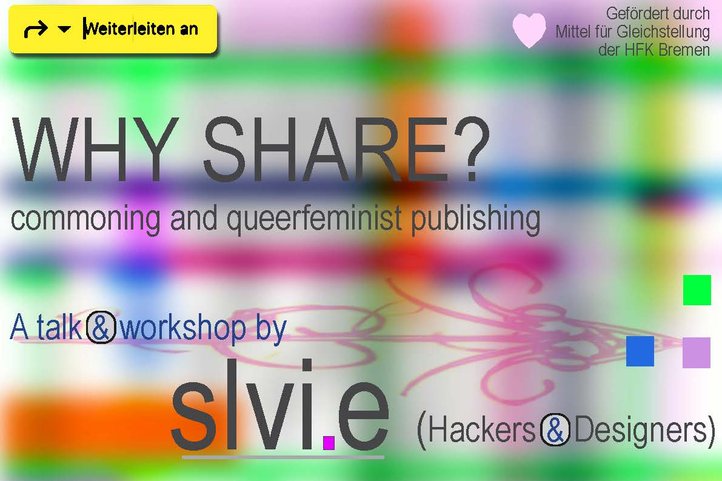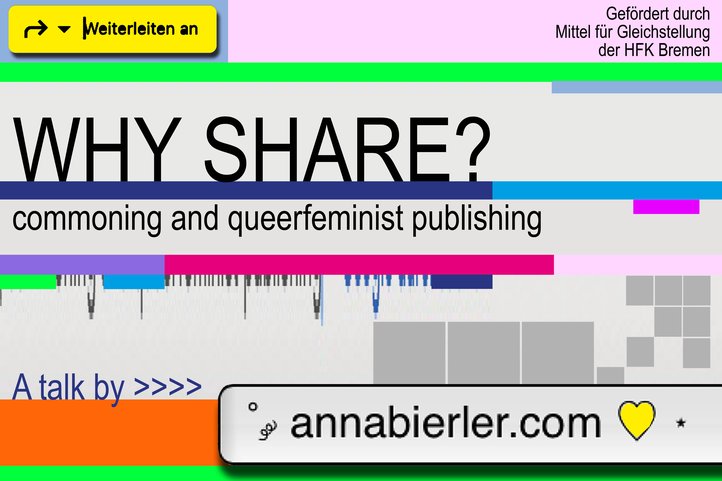Musik + Kunst und Design
Lina Clara von Jaruntowski
Medientheorie
Aktuelle Kurse
Alle öffnen
- Feminist Publishing Practices — Let's crush this 2getha Sweating, leaking, pushing, pulling, splitting, dropping, failing, counting, repeating, lifting—writing. In this course, we will look closely at the relation of writing, designing and experimental publishing — building a body of words, shaping and activating it. Writing is like lifting weights. You push words through failure until meaning slowly grows stronger. We have learned to leave our bodies at the threshold of intellect. Western dualisms draw a line between body and mind — flesh, muscle, bones vs. thought. Feminist writers remind us that we must write our bodies in order to write ourselves out of predefined scripts. “Write yourself. Your body must be heard,” writes Hélène Cixous, while Kathy Acker continues: “By trying to control, to shape, my body through the calculated tools and methods of bodybuilding, and time and again, in following these methods, failing to do so, I am able to meet that which cannot be finally controlled and known: the body.” How can we build a body of words, and our body through words? How can we activate our words through our bodies and our bodies through words? How can we write when our eyes are tired and our hands sore? We will use writing, typesetting and reading exercises that draw from methods and languages of bodybuilding and working out in order to build routines that keep them tethered to the body. You will explore creative writing processes and start to build your own sustained practice. In parallel, we will engage with some fundamentals of visual communication and performative reading. The course will culminate in the development of individual texts, which you will design and publish as a collective exercise book and activate your words in a collective radio show. --- Sweating, leaking, pushing, pulling, splitting, dropping, failing, counting, repeating, lifting—writing. In this course, we will look closely at the relation of writing, designing and experimental publishing — building a body of words, shaping and activating it. Writing is like lifting weights. You push words through failure until meaning slowly grows stronger. We have learned to leave our bodies at the threshold of intellect. Western dualisms draw a line between body and mind — flesh, muscle, bones vs. thought. Feminist writers remind us that we must write our bodies in order to write ourselves out of predefined scripts. “Write yourself. Your body must be heard,” writes Hélène Cixous, while Kathy Acker continues: “By trying to control, to shape, my body through the calculated tools and methods of bodybuilding, and time and again, in following these methods, failing to do so, I am able to meet that which cannot be finally controlled and known: the body.” How can we build a body of words, and our body through words? How can we activate our words through our bodies and our bodies through words? How can we write when our eyes are tired and our hands sore? We will use writing, typesetting and reading exercises that draw from methods and languages of bodybuilding and working out in order to build routines that keep them tethered to the body. You will explore creative writing processes and start to build your own sustained practice. In parallel, we will engage with some fundamentals of visual communication and performative reading. The course will culminate in the development of individual texts, which you will design and publish as a collective exercise book and activate your words in a collective radio show.
- Feminist Publishing and the Aesthetics of the Commons1 Commons or commoning are practices that rethink resources, relations and infrastructures as collectively shared rather than individually owned. They are modes of access, exchange and care that stand against the liberal imaginary of ownership and accumulation. They provide counterpractices and counteraesthetics to hegemonic forms of extraction, hierarchy and profit. Commons are living infrastructures, built and sustained through acts of sharing, co-creation, reciprocity and transparency. In the scope of this class, feminist publishing practices will provide a lens to look at and practically engage with different forms of commoning—the making of tools for gathering, caring for, and circulating knowledge. Here, knowledge and its distribution are less a fixed container than an embodied process of knowing, produced through social and affective knots between people, places, technologies, infrastructures and nonhuman beings. What emerges are prefigurative materialisations that model different relations to work, ownership, and collectivity. Publishing becomes a rehearsal of different ways of working and living together, practicing other possible futures. Over the semester, we will read and discuss theoretical and essayistic texts on feminist publishing, commons, counterpractices, and counteraesthetics. And develop our own strategies for reading, writing, and sharing theory. We will ask: - What tools and practices help us to enter and move through theoretical writings? - In what ways can knowledge be gathered, cared for and circulated within a classroom, a university, a community? - How can publishing become a site for studying collectively? - What kinds of futures are rehearsed when we publish from a feminist perspective? To explore these questions, we will approach theory through practice: with collective readings, creative and experimental writing exercises, and hands-on making. Alongside reading and discussion, you will develop your own contributions—writing experiments, how-to-read-theory instructions, or short texts—that respond to theory both conceptually and creatively. These contributions will come together in a collectively produced workbook, published both in print and online open access. Each of you will take part in one of three working groups—Editorial, Design, or Activation/Distribution—so that the publication itself becomes a shared experiment in feminist publishing. Please note: This course requires active participation. A significant part of the work will be done collaboratively during the lecture period in class. 1 Sollfrank, Cornelia, Felix Stalder, and Shusha Niederberger, eds. Aesthetics of the Commons. Institute for Contemporary Art Research Series, Zurich University of the Arts, volume 24. Diaphanes, 2021. --- Commons or commoning are practices that rethink resources, relations and infrastructures as collectively shared rather than individually owned. They are modes of access, exchange and care that stand against the liberal imaginary of ownership and accumulation. They provide counterpractices and counteraesthetics to hegemonic forms of extraction, hierarchy and profit. Commons are living infrastructures, built and sustained through acts of sharing, co-creation, reciprocity and transparency. In the scope of this class, feminist publishing practices will provide a lens to look at and practically engage with different forms of commoning—the making of tools for gathering, caring for, and circulating knowledge. Here, knowledge and its distribution are less a fixed container than an embodied process of knowing, produced through social and affective knots between people, places, technologies, infrastructures and nonhuman beings. What emerges are prefigurative materialisations that model different relations to work, ownership, and collectivity. Publishing becomes a rehearsal of different ways of working and living together, practicing other possible futures. Over the semester, we will read and discuss theoretical and essayistic texts on feminist publishing, commons, counterpractices, and counteraesthetics. And develop our own strategies for reading, writing, and sharing theory. We will ask: - What tools and practices help us to enter and move through theoretical writings? - In what ways can knowledge be gathered, cared for and circulated within a classroom, a university, a community? - How can publishing become a site for studying collectively? - What kinds of futures are rehearsed when we publish from a feminist perspective? To explore these questions, we will approach theory through practice: with collective readings, creative and experimental writing exercises, and hands-on making. Alongside reading and discussion, you will develop your own contributions—writing experiments, how-to-read-theory instructions, or short texts—that respond to theory both conceptually and creatively. These contributions will come together in a collectively produced workbook, published both in print and online open access. Each of you will take part in one of three working groups—Editorial, Design, or Activation/Distribution—so that the publication itself becomes a shared experiment in feminist publishing. Please note: This course requires active participation. A significant part of the work will be done collaboratively during the lecture period in class. 1 Sollfrank, Cornelia, Felix Stalder, and Shusha Niederberger, eds. Aesthetics of the Commons. Institute for Contemporary Art Research Series, Zurich University of the Arts, volume 24. Diaphanes, 2021.
Veranstaltungen


